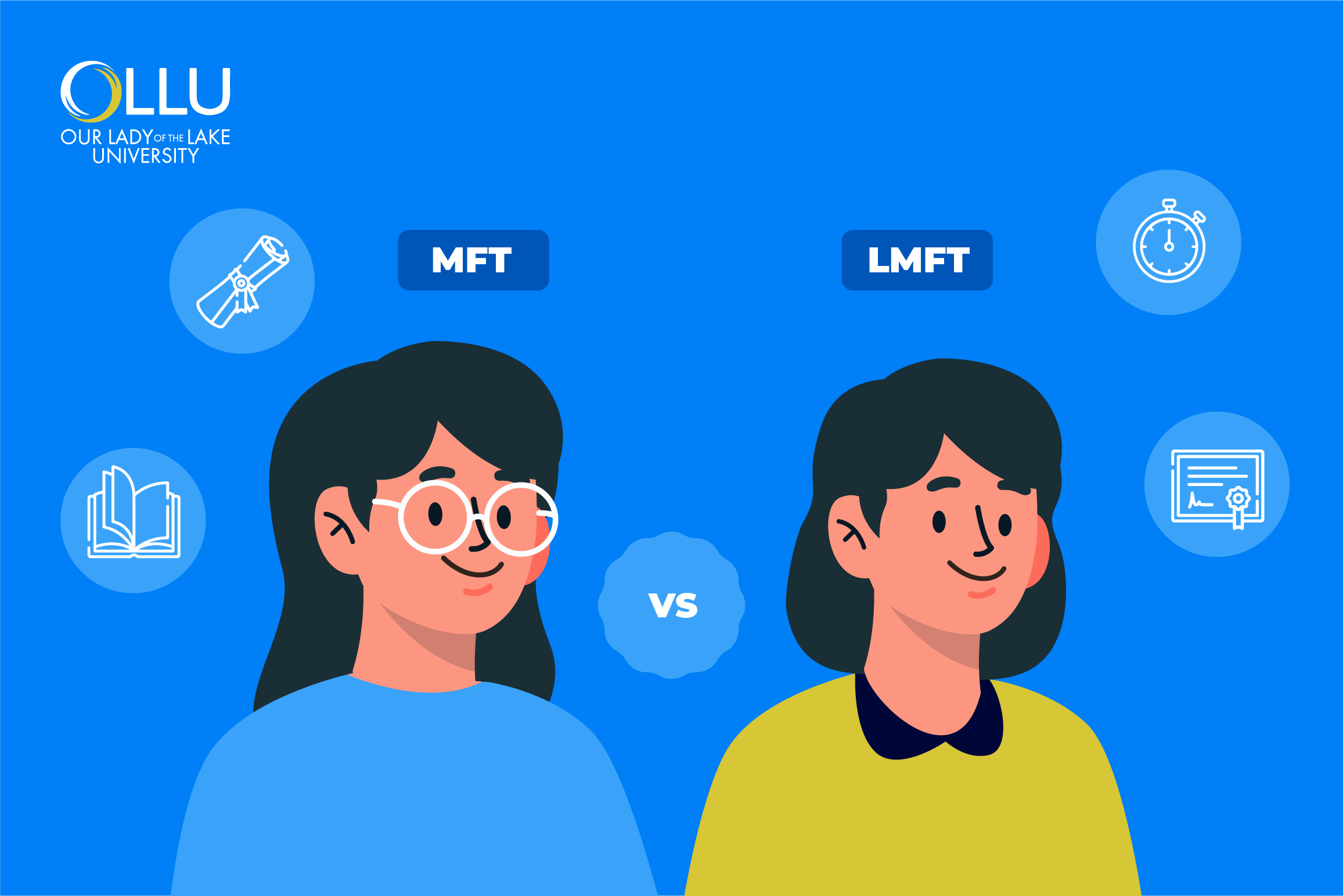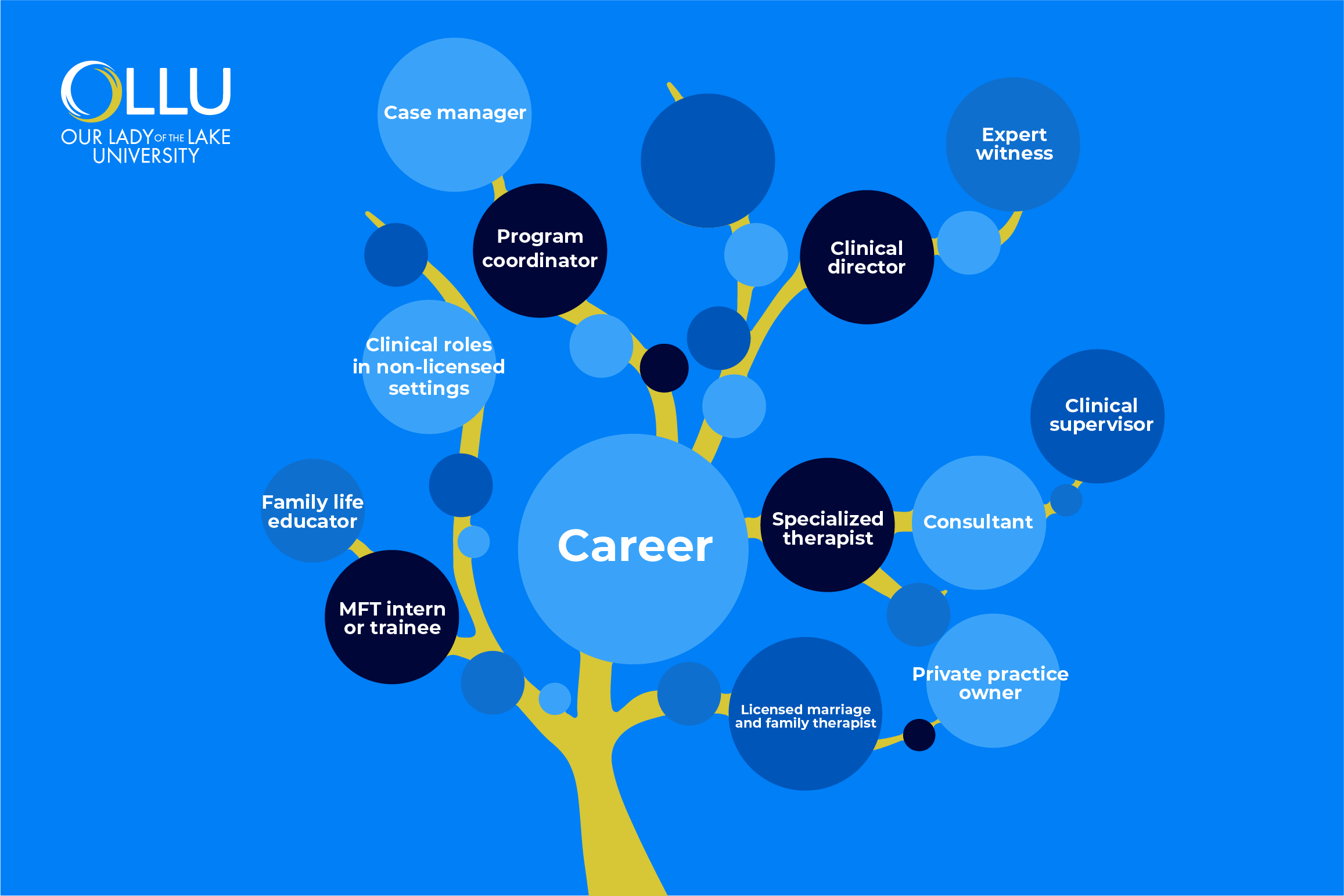MFT vs. LMFT - What's the Difference?
Dec 08, 2023

If you are passionate about helping individuals and families overcome various challenges, a marriage and family therapy career path might be the perfect fit. However, before diving in, it's crucial to understand the distinction between an MFT vs. LMFT, as they are two different paths within this role. They both offer unique opportunities to contribute to the well-being of others, but the journey from MFT to LMFT entails a transformative process.
Are you curious to explore how each title can shape your professional trajectory and the meaningful differences they bring? Let's explore the dynamic realms of marriage and family therapy and licensed marriage and family therapy to uncover the rich possibilities that await those committed to fostering positive change in the lives of others.
What's the Difference Between an MFT and an LMFT?
MFT and LMFT are terms often used interchangeably, but they refer to different professionals within the field of mental health. The critical difference lies in licensure and regulatory status.
The term MFT stands for Marriage and Family Therapist. It refers to psychotherapy experts who specialize in addressing relationship and family dynamics. MFTs work on a wide range of issues that include marital problems, parent-child relationships, individual mental health concerns, and more. They offer services to individuals, couples, and families to help them navigate and overcome various psychological and emotional challenges.
On the other hand, LMFT stands for Licensed Marriage and Family Therapist. The main distinction here is the inclusion of "Licensed," which indicates that the professional has met specific licensure requirements set by the state regulatory board beyond the initial educational requirements.
Educational Requirements to Become an MFT vs. LMFT
To become an MFT, you must typically pursue a specific educational path that encompasses the following steps:
- Bachelor's degree: Begin by earning a bachelor's degree in psychology, counseling, social work, or another related field. This step helps you gain a foundational understanding of human behavior.
- Master's degree: Pursue an advanced degree in marriage and family therapy or a closely related field. Such programs focus on theoretical frameworks, counseling techniques, and practical skills for working with couples and families.
- Clinical experience: Gain supervised clinical experience during the master's program. This step often involves completing a certain number of direct client hours under the guidance of a licensed professional.
Meanwhile, becoming an LMFT entails transitioning from an MFT to a licensed professional. While individuals with an MFT designation can begin their career upon completing the educational requirements, an LMFT must also fulfill all licensure criteria before starting to practice independently. The licensure criteria generally include:
- Accumulating supervised hours
- Passing licensure exam
- State-specific requirements
The licensure signifies a higher level of expertise, allowing the practitioner to work independently and adhere to the ethical and legal standards established by the licensing board.
Career Opportunities: MFT vs. LMFT

Pursuing a career as an MFT or LMFT opens doors to various professional paths. For example, the marriage and family therapy field provides a broad understanding of systemic therapy and interpersonal dynamics, thus enabling you to pursue non-licensed roles in diverse settings.
Similarly, achieving licensure as an LMFT further expands opportunities, allowing for independent practice, private practice ownership, and specialization in areas like trauma, addiction, or specific populations.
Jobs you can get with an MFT degree
Below, we'll explore some of the jobs you can get with an MFT degree.
MFT intern or trainee
As an MFT intern or trainee, you will work under the supervision of licensed professionals and apply theoretical knowledge to real-world therapeutic scenarios. Typically, this role serves as a stepping stone toward becoming a therapist.
The hands-on experience gained through this role is crucial for developing practical skills, honing therapeutic techniques, and gaining insight into the complexities of client interactions. As an intern or trainee, you may have the opportunity to work with diverse populations and utilize various therapeutic modalities, which will provide valuable groundwork for your future as a licensed therapist.
Clinical roles in non-licensed settings
MFT graduates in non-licensed clinical roles within community mental health centers play a vital role in providing therapeutic support to individuals, couples, or families. Working collaboratively with a multidisciplinary team, they contribute to the mental well-being of their clients, often in underprivileged or underserved communities.
In a school setting, MFT professionals address students' psychological and emotional needs. They collaborate with educators, parents, and administrators to create a supportive environment. This career requires involvement in individual counseling, group sessions, and interventions to enhance students' academic and personal success.
These professionals can also be found in social service agencies, providing support to clients in collaboration with social workers, case managers, and other professionals.
Case manager
MFTs also take on a multifaceted position as case managers. They assess clients' needs, coordinate services, and ensure that individuals and families receive appropriate support. Their job involves:
- Collaborating with other professionals.
- Advocating for clients.
- Navigating the complexities of social services to facilitate holistic care.
Program coordinator
As program coordinators, MFT professionals oversee and manage mental health or family-related programs. This job includes designing program structures, implementing interventions, and evaluating outcomes.
Program coordinators contribute to developing and improving services, ensuring they align with the needs of the community or organization.
Family life educator
As family life educators, MFTs focus on the preventive and educational aspects of mental health. They design and deliver workshops, seminars, and educational programs to improve family relationships, communication skills, and coping mechanisms. This role involves empowering individuals and families with practical tools for navigating life challenges effectively.
Career paths as an LMFT
On the other hand, here are some jobs that you can get with an LMFT degree.
Licensed marriage and family therapist
Becoming an LMFT is a significant accomplishment for a therapist. These professionals offer counseling services independently to individuals, couples, and families. They take a systemic approach to address mental health issues, focusing on the connections between relationships and their effects on overall well-being.
Private practice owner:
Many LMFTs choose to establish private practices, allowing them to gain more autonomy in their therapeutic approach and business management. Private practice owners can set their own schedules, specialize in specific therapeutic modalities, and build a loyal client base. This path offers a personalized and entrepreneurial approach to therapy, allowing therapists to tailor their services to meet the unique needs of their clients.
Clinical supervisor
Experienced LMFTs often take on the role of clinical supervisor, guiding and mentoring MFT interns or trainees. This job involves providing oversight, support, and constructive feedback as developing therapists gain clinical experience. Clinical supervisors contribute to the professional growth of their supervisees.
Consultant
LMFTs can offer their expertise as consultants to organizations, businesses, and educational institutions. They can provide guidance on family dynamics, team building, and mental health initiatives, contributing their specialized knowledge to enhance program effectiveness and promote a healthier organizational environment.
Specialized therapist
Licensed marriage and family therapists frequently choose to specialize in specific areas such as trauma, addiction, or working with particular populations. Specialization allows therapists to deepen their expertise, tailor interventions to unique needs, and contribute to specialized fields within the broader mental health landscape.
Clinical director
Experienced LMFTs can transition into leadership roles as clinical directors within mental health organizations. In this capacity, they oversee the clinical aspects of programs, supervise therapists, and contribute to the overall direction of mental health services. Clinical directors play a crucial role in shaping the quality and effectiveness of mental health programs.
Expert witness
LMFTs also serve as expert witnesses in legal proceedings, offering their professional opinions on family dynamics and mental health matters. This role requires clinical expertise and the ability to communicate complex psychological concepts clearly and effectively in a legal setting. Expert witnesses contribute to the legal understanding of mental health issues and their implications on family dynamics.
Future Outlook and Salary
The marriage and family therapy field, including LMFTs, will experience a substantial 15% growth from 2022 to 2032 , surpassing the average growth rate for all occupations. On average, approximately 5,900 job openings for marriage and family therapists are expected each year throughout the decade.
This demand results from workforce replacements, with individuals transitioning to alternative occupations or exiting the labor force, including retirement.
In terms of compensation, professionals in this field earn satisfactory salaries. The estimated total pay for a marriage and family therapist in the US is $91,175 per year , with the average salary ranging from $70,000 to $119,000.
Is a Career in Marriage and Family Therapy Worth It?
Pursuing an MFT career can be highly gratifying and influential, particularly for students who want to help others navigate life's difficulties.
As a professional in the field of marriage and family therapy, you have the power to bring about real change in the lives of individuals, couples, and families. Through your work, you can help foster stronger relationships, promote better mental health, and increase the overall resilience of communities. Furthermore, besides the emotional rewards, the field is experiencing significant growth, providing a stable and highly sought-after career path.
Although the journey requires a commitment to education and licensure, the potential to positively impact people's lives makes a career in Marriage and Family Therapy well worth the effort. So, if you want to explore the intricacies of human relationships and promote positive change, this could be a fulfilling and meaningful path for you.
The Bottom Line
In conclusion, the journey from MFT to LMFT marks the transition from completing educational requirements to obtaining a license, which opens doors to independent practice and diverse career opportunities. Understanding this difference is vital if you're considering a path in marriage and family therapy.
For those eager to delve into this field, Our Lady of the Lake University offers a Master of Science degree in Psychology with a concentration in Marriage and Family Therapy , providing the educational foundation and support needed to navigate the rewarding journey toward becoming a licensed professional. This program is available on OLLU's campuses in San Antonio, Houston and the Rio Grande Valley.
Frequently Asked Questions (FAQs)
What does MFT stand for?
MFT stands for Marriage and Family Therapist.
What is an LMFT license?
An LMFT license signifies that a marriage and family therapist professional has met specific state licensure requirements, allowing them to practice independently, thus becoming a licensed marriage and family therapist (LMFT).
What is the difference between LMFT and MFT?
The main difference between LMFT and MFT is that LMFTs pursue licensure while MFTs enter the workforce after completing their initial educational requirements.
What do marriage and family therapists do?
Marriage and family therapists work with individuals, couples, and families to address relational and emotional challenges. They provide counseling, support, and guidance to help improve communication, resolve conflicts, and enhance overall mental well-being.